- JP
- EN
Dialogue Between Outside Directors and Shareholders
To realize the sustainable enhancement of corporate value, Mitsui O.S.K. Lines, Ltd. has an effective Board of Directors that guarantees appropriate decision-making.
This special feature presents a dialogue in which MOL's outside directors discuss their thoughts on a broad range of topics, with a focus on the Company's governance.

In fiscal 2022, MOL held its Governance Meeting for the first time, providing an opportunity for the outside directors and the chairman of the Board to have a face-to-face dialogue and exchange views with major shareholders.
Three outside directors and MOL's chairman of the Board, Junichiro Ikeda, responded to forthright questions from five institutional investors, about topics such as the development and supervision of management strategies, remuneration and nomination, risk management, and the next management plan.
- Q1 As an outside director of Mitsui O.S.K. Lines, what do you pay particular attention to and emphasize on a daily basis?
-
Fujii: As MOL's outside director, there are two points that are particularly important.
One is the fact that MOL operates a social infrastructure business that plays a role in economic security. It is necessary to comprehensively consider not only business profitability but also its social significance, as well as how the Company responds in the event of unforeseen circumstances. Unfortunately, although not fully acknowledged, there is a stronger need than ever for awareness of marine transport's position as part of economic security, not only by the government but also by society at large.
In the past, MOL was exposed to too much risk compared with its capital, and the focus was on how to confine those risks to within a controllable range. However, with the recent favorable financial performance, the positions of capital and risk quantity have been reversed. How to make effective use of the earned capital will be focused in the upcoming management plan.
My other emphasis is on accountability. I see this as the responsibility to make efforts to provide information in a format that is easily comprehensible for all stakeholders, not in a self-centered way. From that perspective as well, I hope that the institutional investors here today will give their frank opinions about information they have a strong interest in, and about the best ways of communicating it.
Katsu: What I constantly keep in my mind as an outside director is to supervise management from an independent position representing the shareholders and investors. From that perspective, when I look back on my years as an outside director since 2016, my impression is that the MOL Board of Directors has made great strides in its effectiveness year after year. I have also seen a major increase in opportunities and time for discussions beyond the Board of Directors, such as the Nomination Advisory Committee and the Remuneration Advisory Committee, and the Corporate Governance Council. At the same time, the agenda setting of the various meetings has also become more effective, and I truly feel that the role of the Board of Directors is clearly shifting toward a greater focus on the examination and determination of strategies and on its supervisory role.
Another point that I personally emphasize is the upgrading of ESG to realize the mediumto long-term expansion of corporate value. MOL has set innovative net zero targets for reducing GHG emissions in the marine transport area, and in addition to environmental issues, MOL is closely watching social issues, such as the working conditions of seafarers.
In addition, in terms of risk management, I believe that it has become even more important to prepare for unpredictable risks that cannot be sufficiently assessed by conventional quantitative methods.
Onishi: I see my roles as an outside director as fulfilling our commitments to our various stakeholders in open and honest ways and providing full accountability in the event of unfavorable outcomes. Also, as someone who used to work for an airline, even with the differences between marine transport and air transport, from the outset, I have been vocal about safety culture and environmental measures. I am pleased to say that my opinions have been met with extremely positive responses, and most of my recommendations have been fulfilled. It was a different culture for me coming from outside the Company, so to speak, but people in MOL always show a willingness to listen. I sense that MOL has a free and open corporate culture that encourages active exchanges of opinion, generosity toward different cultures, and a visionary ethos.
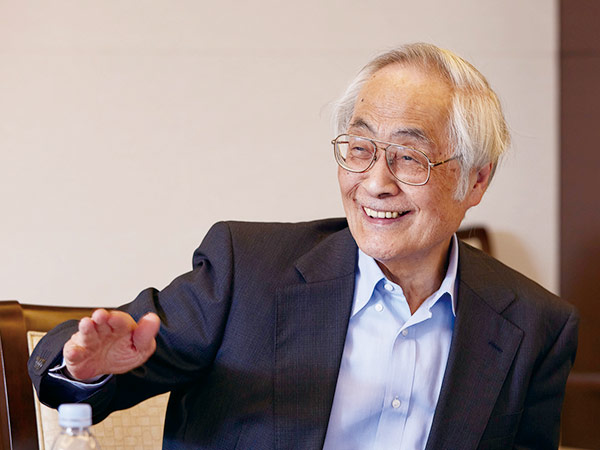
Hideto Fujii, Outside Director 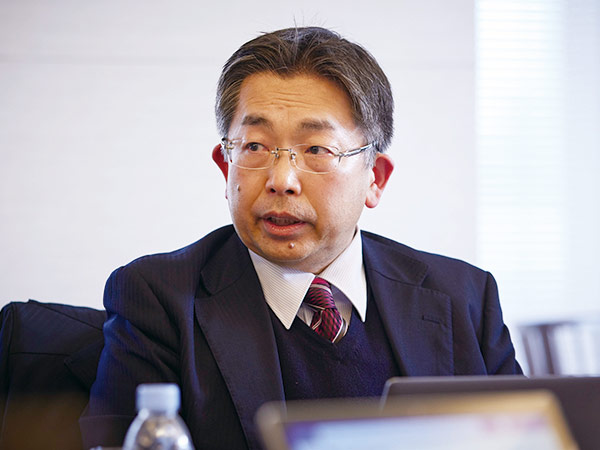
Yuuichi Tezuka, Sumitomo Mitsui Trust Asset Management - Q2 Could you tell us about the reforms of the remuneration plan implemented in fiscal 2020? Also, do you think that climate change responses should be added to the evaluation criteria for directors' remuneration?
-
Onishi: In fiscal 2020, the director remuneration plan was revised for the first time in twenty years. Because MOL's market-oriented business has held a particularly high weight in its business portfolio until now, meaning that its performance is impacted by the circumstances at any given time, the prevailing view was that an evaluation method based on single fiscal year performance is not suitable for the business characteristics
For this reason, in the recent revisions, variable remuneration, which accounts for 40% of the whole, was divided equally between remuneration based on single fiscal year performance and remuneration commensurate with contribution to long-term targets. In addition, the latter is paid in the form of stock grants instead of monetary remuneration. As a result, it became possible that current efforts towards long-term goals were reflected in evaluations, and I feel that it has come closer to the perspective of shareholders. We have also been able to further strengthen awareness of safety by incorporating safety-related results in all directors' evaluations.
Katsu: I also believe that it is crucial to incorporate climate change responses into the evaluation criteria. Climate change response is already assessed in the current system, but in actual practice, it has been limited to qualitative evaluation in terms of the medium- to long-term targets of individual directors, along with other ESG initiatives.
Given its focus on marine shipping, MOL emits large volumes of GHG through the use of fuel on its vessels. Consequently, I recognize the addition of indicators related to GHG reductions in both the short-term and long-term incentive elements of the remuneration plan to further encourage countermeasures and, moreover, the disclosure of those indicators, to be key issues.
- Q3 When the Nomination Advisory Committee and the Remuneration Advisory Committee evaluate the president, do you have an arrangement for the president himself to leave the room to ensure transparency?
-
Katsu: Because the evaluation criteria for directors related to single fiscal year performance-based remuneration are quantitative indicators, evaluation can proceed whether the person being evaluated is present or not. I assume that your question refers to whether or not the president himself should be present during deliberations regarding the "targets for individual directors" portion of remuneration based on contribution to long-term targets, which requires qualitative judgments. Currently, the president conducts evaluations of individual directors and submits them as proposals to the Remuneration Advisory Committee. For the president's evaluation alone, the chairman confirms the contents before submission.
There is currently no arrangement for the president to leave the room while his remuneration is being deliberated, but an awareness of this as an issue has emerged internally, so we ameliorate this issue from fiscal 2023 onward.
Fujii: I agree with your suggestion considering what form would better satisfy our stakeholders. On the other hand, as you may have sensed from the discussions so far, we outside directors do not shrink from expressing severe opinions in Board of Directors meetings. We would certainly not hold back in our comments, just because the president being evaluated is present.
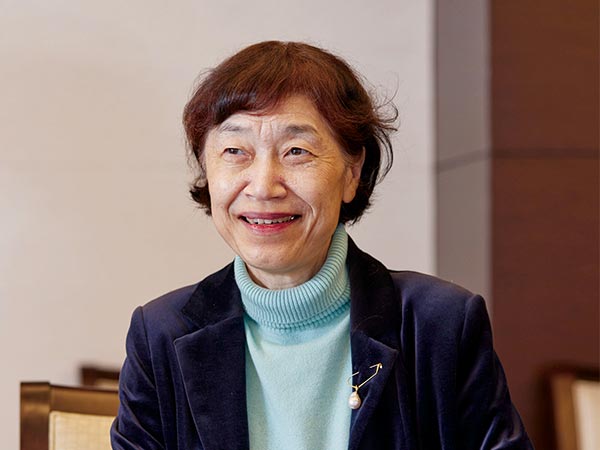
Etsuko Katsu, Outside Director 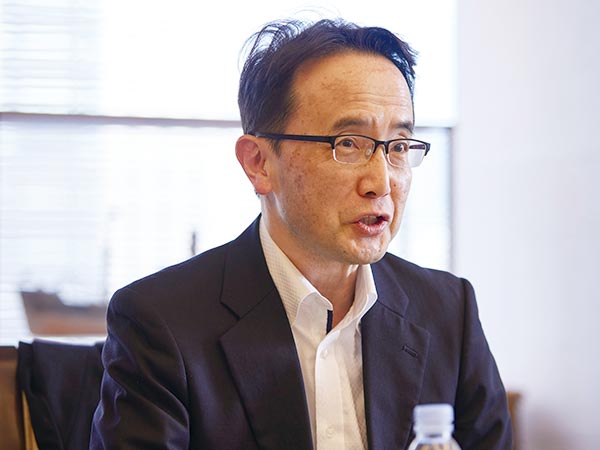
Yasushi Arakawa, Asset Management One - Q4 Could you tell us about the formulation of the succession plan for the selection of the next president?
-
Onishi: We have summed up the basic policy of the president's succession plan from two fronts, namely "the approaches, values, and attitudes that would lead to the results expected of the president" and "competencies." The selection of the president, Mr. Hashimoto, went very smoothly based on this approach, and I believe that we have been able to develop wellfunctioning mechanisms.
Fujii: A key outcome of the formulation of the succession plan has been the codification of the profile and expertise required for the next president. The members of the Nomination Advisory Committee and the Board of Directors now have a clear common understanding of what is required, including the selection process.
Employing an independent advisory committee for the nomination of the president is one way. However, I believe that people from within the Company would have a better image of the most suitable person to inherit MOL's DNA as a company engaged in social infrastructure, in addition to the character of the candidates. At this juncture, I believe that the Nomination Advisory Committee, consisting of both internal and outside directors, is the best option for conducting grounded discussions about candidate selection.
- Q5 Could you describe the development of the skills matrix and your approaches to future board succession?
-
Onishi: Our approach to the skills matrix was to ask ourselves what are the necessary skills in the Board of Directors of MOL. Accordingly, we have also included skills that are not being fully satisfied by the current members of the Board. In our consideration of board succession going forward, we will seek out people who will be able to fill those gaps in the Board's skills.
Fujii: At that time, accountability for easy understanding will be another key consideration. The skills matrix is simultaneously both a guideline for selecting directors and a tool for indicating how the Board of Directors will use its skills framework to address corporate governance and business. The matrix must be used to explain in ways that will engender the confidence of stakeholders.
Board succession is also one of our key issues. Having said that, to avoid misunderstandings, I would add that, in practice, the Nomination Advisory Committee cannot be involved directly nor specifically in the individual profiling and selection of the group of junior executive candidates who will lead the next generation. Therefore, I believe it would be more appropriate for the committee to supervise and give advice on the framework for board succession. This would include whether a suitable succession plan has been prepared, how the group of candidates has been secured, and what steps the replacement process will take.
I will also add that, if we consider the appropriate size of the Board of Directors, I do not see the need to retain all the skills in-house. For example, at the moment, we need expertise regarding current geopolitical risks, but that may not necessarily be a permanent requirement. In my view, to meet those skills requirements, a more flexible and realistic arrangement would be to utilize external capabilities according to the situation at hand, for example, by appointing advisors as necessary.
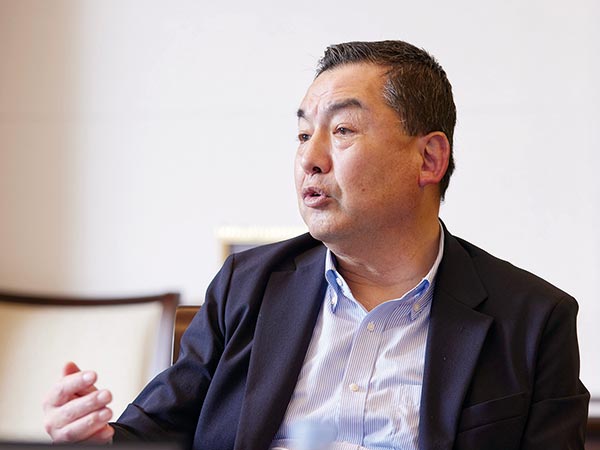
Masaru Onishi, Outside Director 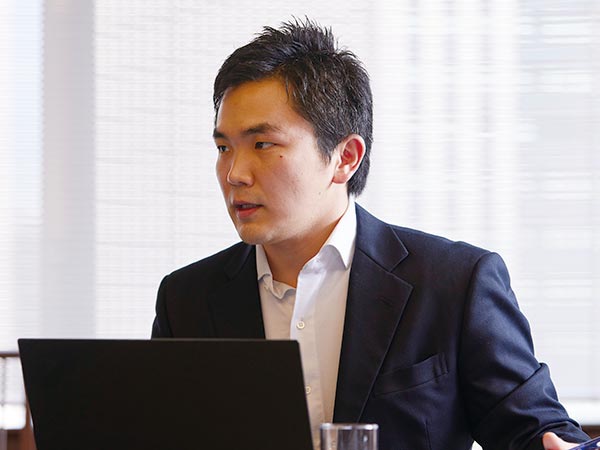
Masamichi Fujisawa, BlackRock Japan - Q6 I understand that you have been considering changes to the governance system to further enhance the effectiveness of the Board of Directors. Could you tell me how far those discussions have progressed?
-
Onishi: Discussions on changes to the governance system have taken place in the Corporate Governance Council established last fiscal year. Consisting of ten members, namely the three representative directors, three outside directors, and four Audit & Supervisory Board members (internal and outside), it is a small forum that is conducive to the free expression of opinions. As a result of discussions of the ideal Board of Directors we should aspire to, we reaffirmed our policy to move away from a management focus, in which the Board's efforts are concentrated on the deliberation of individual investments, toward a focus on the examination and determination of strategy and its supervisory role.
On that basis, in our consideration of specific policies, to better understand the realworld applications, as opposed to textbookbased knowledge, we invited to the Corporate Governance Council the management executives of three companies that have different governance systems from MOL's current system of a company with an Audit & Supervisory Board, and we held interviews and discussions with them. While this process did give us a more complete understanding of other governance systems that we could adopt, conversely, it also made us realize that it would be possible to realize the desired image of the Board of Directors even with our current system. In conclusion, therefore, we chose to maintain the current governance system. We also discovered many areas for improvement, so we will work on those improvements throughout fiscal 2023.
Ikeda: Please let me add some extra comments. In the realization of a Board of Directors focused on the examination and determination of strategy and on its supervisory role, we faced the issue that, realistically, too much time would be taken up by formalistic agenda items. Under the current governance system, there are many matters that require resolutions due to the requirements of the Companies Act, and a great deal of deliberation is also devoted to individual investment proposals. Unless we significantly narrowed down the proposals presented, it would be impossible to secure enough time for examination and determination of strategy and supervision. As such, we were considering whether we should address this problem with a change of governance system or by keeping the current system but improving the way it is implemented.
The management executives of the companies we invited each gave us the same advice. They said that there was no one-sizefits-all governance system and that we should consider what would be the best model to suit our own company. We also learned that various companies employ different governance systems, but there is no significant difference in their goal, namely, a focus on examination and determination of strategy and on supervision. After thorough discussions on that basis, we concluded that a change of governance system was not necessarily a must at this juncture, and that, even with our current system of a company with an Audit & Supervisory Board, we could still adequately realize our vision for the Board of Directors by exercising ingenuity in how the system is implemented.
For my own part, I believe that the Audit & Supervisory Board has significance as a "final bulwark." MOL is not prone to internal squabbles or scandals, but in the unlikely event that the Board of Directors were to become dysfunctional, there is tremendous value in the existence of the Audit & Supervisory Board as a brake on that dysfunction.
- Q7 How, specifically, do you narrow down the number of investment proposals presented to the Board of Directors?
-
Ikeda: We narrow investment proposals by their monetary scale. Single investments worth over 40 billion yen are matters for resolution by the Board of Directors. In the future, we hope to give some consideration to creating a mechanism for delegating the authority for long-term, stable projects that have a relatively small risk, such as LNG ships, for example.
Conversely, novel investments, even if they do not meet the 40-billion-yen threshold, are subject to proper deliberation. For example, involvement in the upstream areas of the energy business and other projects that are key to our portfolio strategy would not be left up to the executive but would be deliberated by the Board of Directors, which would ask about their strategies.
- Q8 Do you consider that your equity-method affiliates, including ONE, which is a major source of GHG emissions, should also be factored into MOL’s own reduction targets?
-
Onishi: This is slightly off-topic, but when I was serving as a director of the International Air Transport Association (IATA), an international organization for the aviation industry, the organization proposed a daring standard of capping GHG emissions at 2020 levels and not increasing them after that. As a result, the aviation industry is now adhering to this rule. This experience led to my personal conviction that, in environmental strategy, it is pre-emptive action that leads to victory, and I have expressed a variety of opinions at MOL to that effect.
They came to understand my point, which led to the formulation of the Environmental Vision 2.1 in 2021. What I found wonderful at that time was that, not only did they appoint an officer responsible for the environment, but they also established the Environment & Sustainability Strategy Division, giving the responsible officer a team for accountability and action. I think that MOL is to be commended for its emphasis on effectiveness of its environmental responsibilities.
Regarding your question about ONE, as an equity-method affiliate, MOL holds 31% of the shares in ONE, and naturally, we certainly do not take our environmental responsibilities lightly. However, the extent of responsibility is dictated by control approach. ONE has established its own environmental targets and criteria, so, at this time, our responsibility is to monitor the company’s progress as a shareholder.
- Q9 Based on future portfolio strategies and social changes, could you tell us about your human resources plans for the realization of the next management plan?
-
Katsu: MOL has quite a unique arrangement, in that the chairs of both the Nomination Advisory Committee and the Remuneration Advisory Committee and the chair of the Corporate Governance Council rotate every year. Speaking from my own experience serving as chair of the Nomination Advisory Committee in fiscal 2020, the development of human resources to realize the next management plan is a key theme for us both in terms of examination and determination of strategy and supervision. In the rebuilding of the business portfolio into market-driven and stable revenue businesses, or into shipping and non-shipping business fields, we have seriously examined how we should allocate our personnel resources among the corporate, sales, and overseas divisions, and what kind of decisionmaking process we should employ in that regard.
As part of that examination, on January 1, 2023, a new Human Capital Strategy Division was established as an organization to promote and manage human resources strategies to support future business growth. This division will now play a central role in efforts toward HR development by appointing the right people to the right positions under centralized management, including people employed by Group companies and overseas locations. Going forward, we will increase the quantity and quality of our human resources alongside the expansion of the business portfolio. In that process, our priority will be to ensure it aligns with our management plan.
At the same time, in the area of diversity management, such as the promotion of foreign nationals and the empowerment of women in the workplace, we will publicly set KPIs and work toward achieving them. We will also similarly address areas such as training, internal advertising for vacant positions, and employee engagement measures. While feeding these areas back into the medium-term management plan, we will need to further pursue HR development in a way that contributes to the medium- to longterm enhancement of corporate value.
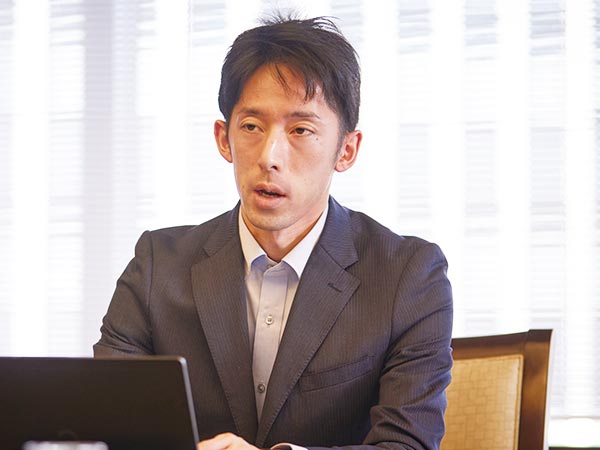
Yasushi Kondo, Resona Asset Management 
Nariaki Hirano, Nomura Asset Managements - Q10 Your new medium-term management plan will be launched in fiscal 2023. As outside directors, what kind of roles do you see yourselves playing in that plan?
-
Fujii: Since 2017, MOL has implemented a rolling management plan that is updated annually, focusing on fiscal 2027 targets. Through this approach, we have finally laid the groundwork to embark on a full-scale medium- to longterm management plan. The longer the term of a plan, the more efforts are required to convince stakeholders. In this respect, we will establish a clear vision, as well as action plans and KPIs for each phase to serve as milestones towards achieving that vision, to ensure that the plan presents a full package that is worthy of stakeholders' trust.
Katsu: In recent years, the situation in society has been extremely unpredictable. This is the reason for MOL's adoption of highly flexible rolling management plans. However, we are now at the stage where we can declare a firmer medium- to long-term plan. Management will steer it properly, and I believe that our role as outside directors in supervising management will become more important.
Ikeda: For some years now, we have been conducting Deliberation on Corporate Strategy and Vision session ten or so times a year. This is where a certain theme, such as a specific business, is selected, and we devote about 1.5 hours of the 3-hour Board of Directors meeting to debating strategy and vision related to it. In fiscal 2022, this framework was largely used to discuss the management plan.
Our very first task in that process was to discuss the broad framework of the management plan in the Board of Directors, and the executive officers have now proceeded to develop the specifics based on the discussion results. The work is proceeding, with the specific proposals developed by the executive officers being presented for Board of Directors feedback on a relatively short cycle.
- Q11 Finally, could you tell us your thoughts on risk management and on the upgrading of business profitability management, including the introduction of ROIC?
-
Ikeda: The excellence of ROIC as an indicator is beyond dispute. Until now, shipping has been at the center of our business, and there were only small differences between individual areas, which meant that simple ROA-based management was sufficient for our purposes. However, given that we will be strengthening a wide range of nonshipping businesses, we will need an indicator that shows the extent of return against the size of the balance sheet that is used as a yardstick for comparisons across businesses. We hope to examine this point, including the expansion of the ROA concept, as a key issue going forward.
Onishi: On another topic related to risk management, for the past several years, MOL has been engaged in the interesting initiative of "megatrend prediction." These predictions are based on the World Energy Outlook (WEO) of the International Energy Agency (IEA), coupled with MOL's own expertise. A variety of factors, including environmental factors, economic factors, and demographics, have a tremendous impact on our business. The extent to which society will or is able to demand environmental actions will have a great impact on the marine transport business. Given the wide range of the predictions we make, they could aid in assessing the risk of our owned vessels turning into stranded assets, which is an issue of concern for investors. However, I believe that there is still a long way to go in utilizing them for risk management. There has been visible progress made during my involvement as an outside director, and I look forward to seeing further advances in this regard.

Junichiro Ikeda, Representative Director, Chairman Executive Officer
- On the conclusion of the Governance Meeting
-
This was the first time that an opportunity was arranged for institutional investors and outside directors to hold direct dialogue. In my position as chair of the Corporate Governance Council, several points drew my notice.
One is that, thanks to the clear questions that were asked, I was able to reaffirm what areas each of the outside directors emphasize as they engage in the Board of Directors.
I also noticed that MOL's Board of Directors is making steady and confident progress towards strengthening corporate governance, including risk-taking.
However, this dialogue also clearly confirmed for me their awareness of the many issues that remain to be addressed, which I feel has been a tremendous outcome of this initiative.Outside Director (Masaru Onishi, FY2022 Chair of the Corporate Governance Council)
- Sustainability TOP
- Message from the Chief Sustainability Officer
- Sustainability
Management - Value Creation
Stories - Safety & Value
- Environment
- Human & Community
- Innovation
- Governance
- Stakeholder
Engagement - Sustainable Finance
- Sustainability Data
- ESG Disclosure
Guideline Indexes - External Recognition
- Library




